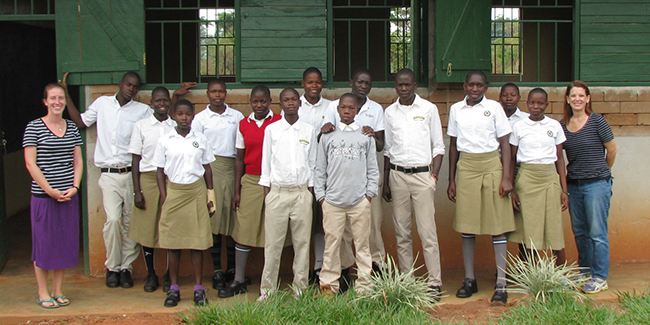On the banks of the Nile River in Uganda lies a relatively new Christian community known as Restoration Gateway. Started by a Baylor couple, Dr. Tim McCall, BA ’71, and Janice Moore McCall, School of Education alumna, BA ’71, BMEd ’72, Restoration Gateway was created to help serve Ugandan orphans and provide them with a caring home and an education.
Over spring break, School of Education Associate Dean and Associate Professor Dr. Suzanne Nesmith, along with four other professionals from Baylor, traveled to Uganda to provide assistance with the school’s science needs. They called themselves the “BU Sci 5”.
Restoration Gateway (RG) operates its own school, The Oak of Righteousness. Recently, some of the school’s students passed a Ugandan test that allows them to advance from primary to secondary school. “Secondary education is something new at RG, and one of the areas they found they needed assistance with was science,” Nesmith said.
 The school had two key science needs — the need for science supplies and the need for guidance on how to teach science effectively.
The school had two key science needs — the need for science supplies and the need for guidance on how to teach science effectively.
When the McCalls recognized these needs, they reached out to Baylor hydrogeology professor Dr. Joe Yelderman and his graduate student Stephanie Wong, who had previously visited RG to assist with evaluating the quality of RG’s water supply. The McCalls requested that Yelderman and Wong return to RG with a group who could provide assistance with their science education needs. Nesmith was uniquely qualified to join the group because she not only has a science background, but an education background as well.
“Thankfully they reached out to me and asked if I would you be interested in joining the group as a science educator — and, of course, I was,” Nesmith said.
The BU Sci 5 group included Dr. Joe Yelderman, a Professor of Hydrogeology and Director of Baylor’s Wastewater Research Program; Stephanie Wong, a doctoral student in Baylor’s Department of Geosciences; Dr. Suzanne Nesmith; Mr. Doug Nesmith, the Environmental Science Laboratory Coordinator at Baylor; and Melissa Mullins, the Environmental Education & Outreach Coordinator at Baylor. Each member of the team served a different purpose and brought a unique area of science expertise to the team. These areas of expertise were brought to bear when each group member designed and shared a science lesson with the students and teachers of The Oaks of Righteousness.
 “Our focus was to meet the needs of RG. We wanted to get the science supplies to Uganda, make sure the teachers understood how to use them, and also to provide some model lessons,” Nesmith said.
“Our focus was to meet the needs of RG. We wanted to get the science supplies to Uganda, make sure the teachers understood how to use them, and also to provide some model lessons,” Nesmith said.
Nesmith emphasized the school’s desperate need for science supplies and explained that the group fulfilled as many of the school’s supply requests as possible. “You cannot teach science effectively without doing science, and you can’t do science without the required resources,” she said.
The supplies they brought included magnets, light microscopes, magnifying glasses, binoculars, posters, among many others.
Another task Nesmith completed while in Uganda was collecting data to add to her research. She is researching how children and teachers perceive science and scientists. Specifically, she wants to determine if living in the U. S. versus Uganda makes a difference in perceptions of science and scientists. Nesmith also interviewed the teachers to explore the contextual features they believe impact their effectiveness as science teachers.
Nesmith said she was amazed by the children at Restoration Gateway and is extremely grateful for her experiences there. “I hope I have the opportunity to go back,” she said.
—By Lana Baugh
For more news from Baylor School of Education, visit the Instant Impact home page.
ABOUT BAYLOR SCHOOL OF EDUCATION
Founded in 1919, Baylor School of Education ranks among the nation’s top 20 education schools located at private universities. The School’s research portfolio complements its long-standing commitment to excellence in teaching and student mentoring. Baylor’s undergraduate program in teacher education has earned national distinction for innovative partnerships with local schools that provide future teachers deep clinical preparation, while graduate programs culminating in both the Ed.D. and Ph.D. prepare outstanding leaders, teachers and clinicians through an intentional blend of theory and practice.
ABOUT BAYLOR UNIVERSITY
Baylor University is a private Christian University and a nationally ranked research institution. The University provides a vibrant campus community for more than 16,000 students by blending interdisciplinary research with an international reputation for educational excellence and a faculty commitment to teaching and scholarship. Chartered in 1845 by the Republic of Texas through the efforts of Baptist pioneers, Baylor is the oldest continually operating University in Texas. Located in Waco, Baylor welcomes students from all 50 states and more than 80 countries to study a broad range of degrees among its 12 nationally recognized academic divisions.

